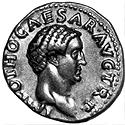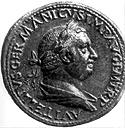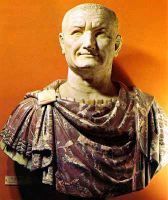
The Roman emperor Nero
With the end of the family of Augustus, some people thought that Rome might go back to being a real Republic again. But nobody really remembered how to do that, and anyway they were too afraid of civil wars. But they got civil wars anyway, for the next year. Nero killed himself in 68 AD with the governor of Spain, Galba, marching on Rome.

The Roman emperor Galba, first of the four emperors of 69 AD
Once Nero was dead, Galba made himself emperor. But almost immediately, in January 69 AD, the governor of Upper Germany (Northern Germany) also rebelled, and marched on Rome. His name was Vitellius. At about the same time, one of Galba’s supporters, Otho, turned on him and killed him.

The Roman emperor Otho, the second of the four emperors of 69 AD
So Otho briefly became emperor. He fought Vitellius, but he lost and was killed, and Vitellius became emperor. Vitellius is remembered mostly for his reputation for liking to eat tons of good food.

The Roman emperor Vitellius, the third of the four emperors of 69 AD
All three of these emperors had come from the West, and by this time the army in the East, in West Asia, was starting to feel that they should have an emperor who would pay more attention to them. They were fighting to put down the First Jewish Revolt.

Vespasian, the last of the four emperors of 69 AD – and the one who lived.
So they chose their own general, Vespasian, to be emperor. In the fall of 69 AD, one of Vespasian’s friends fought Vitellius, and Vitellius was killed, so Vespasian became emperor. Four emperors in one year! People were really afraid the old civil war time was coming back again. So they were glad to settle down with Vespasian as emperor.
More about Vespasian and the Flavians
More about the First Jewish Revolt
Or more about Roman food
Bibliography and further reading about the year of the four emperors:
Classical Rome, by John Clare (1993). For kids, the whole political history from beginning to end.
The Romans: From Village to Empire, by Mary Boatwright, Daniel Gargola, and Richard Talbert (2004). Okay, it’s a little dry, but it is up to date and has all the facts you could want.
The Roman Empire, by Colin Wells (1984). More readable. Alternates chapters on political and social history. Unfortunately, he stops at the third century crisis.
The Year of the Four Emperors, by Kenneth Wellesley (3rd edition 2000).
Vespasian, by Barbara Levick (1999). The only biography of Vespasian in English. Mainly for academics.